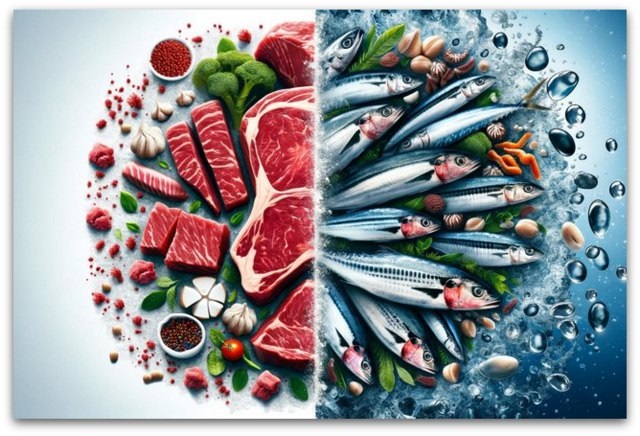
The study claims that the consumption of red meat should be limited, which should positively affect the health of people and the planet.
If red meat in the diet is replaced by small blue fish, such as anchovies, sardines or herring, by 2050 numerous diseases could be reduced globally and up to 750,000 human lives could be saved annually, according to the results of a study conducted by a Japanese team. and Australian scientists.
In the UK alone, cutting red meat consumption by 8 per cent and replacing it with small fish in the diet over the next 26 years could prevent 10 per cent of deaths from heart disease, say Japanese and Australian scientists who have carried out the biggest analysis since this kind based on data available from more than 130 countries in the world.
The research also showed that the benefit of such a diet would be felt most in the poorer countries of the world.
The tiny bluefish is nutrient-dense with a low carbon footprint, although humans consume only about 26 percent of the catch.
The rest of the catch, including a significant amount caught in the seas of countries facing malnutrition and food insecurity, is turned into fishmeal and fish oil, which are fed to more expensive farmed fish such as salmon and trout.
Scientists decided to investigate whether replacing the consumption of red meat with small fish could reduce the rate of disease in humans, resulting in a healthier lifestyle and lower mortality.
To contribute to the general improvement of human health, as well as the health of the planet, we should limit the consumption of red meat and turn to healthy and ecological foods, they reported in the journal BMJ Global Health.
Compared to red meat, seafood not only provides higher concentrations of essential nutrients, but also prevents the spread of diet-related non-communicable diseases.
The small blue fish is rich in long-chain omega-3 polyunsaturated fatty acids, the intake of which can prevent the development of coronary diseases, and it is also rich in calcium and vitamin B12.
The researchers also point out that the little bluefish has the lowest carbon footprint compared to any other animal food source.
Chronic diseases are responsible for 70 percent of all deaths worldwide in 2019, including diseases of the circulatory system, colon cancer, diabetes and stroke.
A team of scientists predicted red meat consumption over the coming decades in 137 countries worldwide, estimating the availability of small bluefish as a substitute for red meat by 2050, using historical fishing data.
They found that the aforementioned change in dietary habits could prevent between 500,000 and 750,000 deaths globally by 2050, especially when it comes to heart disease.
They admit that only small fish is not enough, when it is a dietary substitute for all red meat, but they pointed out that it can be a promising alternative.
The British National Health Service (NHS) reminds that red meat such as beef, lamb and pork is an integral part of a healthy diet.
But if large amounts of such meat are consumed daily with the addition of meat products such as ham, bacon and salt beef, the result can be an increased risk of developing colon cancer and numerous other diseases.
The researchers emphasized that there is a need to limit the consumption of red meat, which causes large emissions of greenhouse gases, as well as the need to switch to healthy and ecological food. The ultimate goal is to “reduce the burden” of diet-related chronic diseases in the coming decades.
They also believe that policies should be devised to distribute fish stocks to regions where they are most needed – Africa, parts of Asia, Latin America and the Caribbean in order to limit the global burden of disease.








